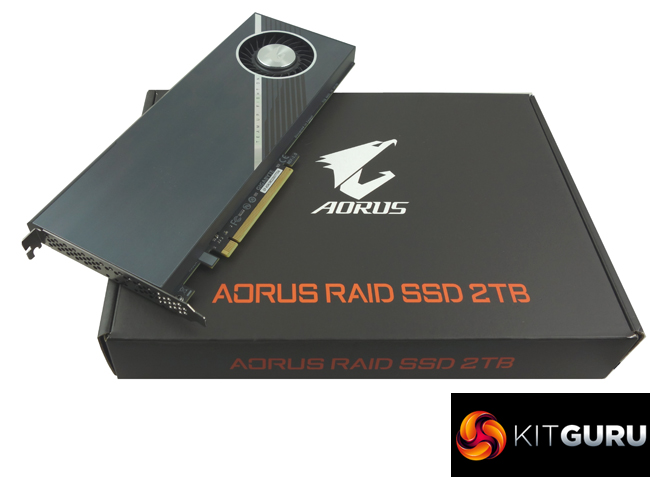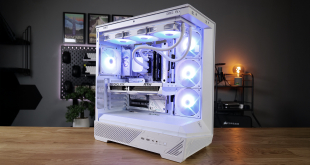Although Gigabyte's AORUS RAID SSD 2TB drive has been around for a while, it's still a viable option for those gamers/enthusiasts who are wanting a drive with PCIe Gen 4 levels of performance but are using a motherboard with only PCIe 3.0 architecture. Gigabyte’s motherboard compatibility list for the drive states it can be installed on Intel X299, Z390, Z490 motherboards, as well as AMD TRX40 and X570 boards.
To reach the level of performance that the AORUS RAID SSD offers via a PCIe Gen3 interface, Gigabyte has built the drive on an AIC (add-in-card) format. Sitting under the well-designed heatsink (more on that in a moment) are four 512GB Gigabyte NVMe drives which each use a combination of 3D TLC NAND and a Phison E12 controller. Controlling the four drives overall is an enterprise-grade Intelligent NVMe Switch (Marvell 88NR2241-BWW2). The drive comes with the internal drives already built into a RAID 0 array, but the Marvell 88NR2241 also supports JBOD, RAID 1, and RAID 10 arrays which can be built/deleted using the Marvell page in the motherboard's BIOS.
With four SSDs and a high data rate switch, things are bound to get pretty toasty inside the drive but Gigabyte has built a serious amount of cooling into the drive to prevent any serious overheating issues. The cooler, which covers the entire PCB uses a metal backplate and a well designed top cover. The drive uses a mix of passive and active cooling to keep the four SSDs cool with the Marvell controller having its own passive cooler.
There are three high thermal conductivity pads for the drives; one under the M.2 baseplate with another on top and the third sitting between the drives and a 5.5mm high-density heatsink. Finally, there is a tri-mode (silent, balanced and performance) 5cm blower fan sitting at the far end of the PCB. To make sure everything runs smoothly the drive uses no less than nine temperature sensors, 2 per SSD and one for the Marvell Intelligent NVMe Switch.
To see how well all this cooling supported the drive we kept an eye on the temperatures as we ran our performance stability test which pushes a drive hard. At the start of the test, the drive was showing a temperature of 39°C (ambient 23.7°C) and peaked at 57°C during the benchmarking process, which is below the 70°C operating limit noted in the specs for the drive, and cause any throttling problems.
Gigabyte quotes sequential read/write figures for the AORUS RAID SSD drive as up to 6,300MB/s and up to 6,000MB/s respectively. Using the ATTO benchmarking tool we couldn’t get to the maximum official rating for reads or writes, the tested drive producing a read figure of 6,090MB/s with writes at 5,770MB/s. However, we could confirm the official numbers with the CrystalDiskMark 8 benchmark with the best read result being 6,590MB/s (using compressed data) with 6,245MB/s being the best write result.
We found the Gigabyte AORUS RAID SSD 2TB on Watercooling UK for £409.24 (inc VAT) HERE.
Discuss on our Facebook page HERE.
Pros
- Near PCIe Gen 4 sequential performance.
- Well thought out cooling array.
- Easy to set up.
Cons
- Needs 8 PCIe lanes for full performance.
- 4K random performance is a bit disappointing.
- Pricey.
KitGuru says: Gigabyte's AORUS RAID SSD delivers PCIe 4.0 type sequential performance for those people who are using PCIe 3.0 based systems, but you do pay a premium versus a single 2TB PCIe 4.0 SSD.
 KitGuru KitGuru.net – Tech News | Hardware News | Hardware Reviews | IOS | Mobile | Gaming | Graphics Cards
KitGuru KitGuru.net – Tech News | Hardware News | Hardware Reviews | IOS | Mobile | Gaming | Graphics Cards




